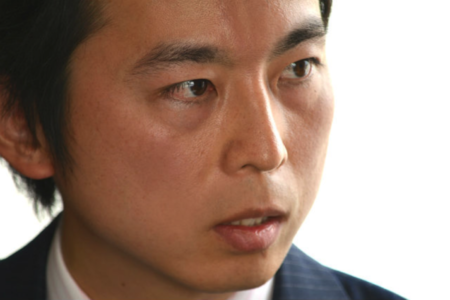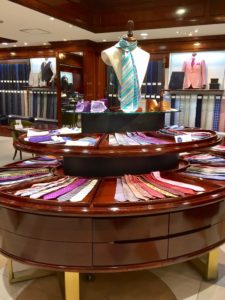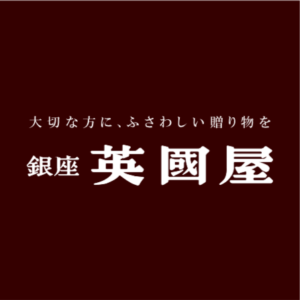Clothing for Executives 〜Ginza Eikokuya〜

Keeping the Traditions of a Well-established Company
Interview with CEO of Ginza Eikokuya Hideki Kobayashi
Founded in 1940, "Ginza Eikokuya" has been manufacturing and selling custom-made suits, chosen by top business leaders in all fields. Their corporate philosophy is: "to provide clothing suitable for active executives worldwide."
As a young leader, Hideki Kobayashi took over the family’s company, along with its history and tradition begun by his grandfather and is now leading it to new heights. In this interview, I heard the secret to the success of his business.
(Interviewer: Shusaku Hayakawa ・ Management Consultant / Editor: Floor Corporation)
Eikokuya’s criteria for "business clothing"
 Hayakawa: The apparel market is easy to enter, but at the same time, it’s a very competitive industry. There are many clothing commercials on TV advertising big discounts and “two for the price of one” sales. Big suburban suit retailers put out their flags advertising bargain sales. How do you see the current market trends for apparel?
Hayakawa: The apparel market is easy to enter, but at the same time, it’s a very competitive industry. There are many clothing commercials on TV advertising big discounts and “two for the price of one” sales. Big suburban suit retailers put out their flags advertising bargain sales. How do you see the current market trends for apparel?
Kobayashi: Until a couple of years ago, whatever was "the latest in fashion" was the preferred choice that sold on the market. Now I think that has shifted, to what is presentable and acceptable in the overall business world. Previously, we would often hear comments like, "If only the line could be thinner," or, "The image should be slim", but I think that comments like this have decreased considerably.
From the very foundation of our company until now, Ginza Eikokuya has consistently offered, "Clothing that is suitable for executives." To this end, it has been necessary to make appropriate suggestions to customers, based on: what kind of suits make the most sense and are acceptable in the executive world. Our strength is in the accumulated knowledge, expertise, and common sense we have acquired over many years of dressing for the executive world.
Hayakawa: Do you mean that executives shop at Ginza Eikokuya because the highly trained sales staff can propose appropriate clothing that allows their customers to fit in comfortably anywhere, without being swayed by trends?
Kobayashi: That's right. For example, think about the clothes worn by the top people in the business world. You won’t see anyone wearing a very slim suit, because that does not project the right fashion image for top leaders of the business world.
The criteria for "clothing" that our company values most is: "Who does the customer want to gain trust and confidence from?" In order to develop your own business, it is important to turn your attention to whom you should earn trust from, and for that purpose you need "clothing" based on the dress sense of those people. That is the value that we can offer to customers.
Aim for a company where employees can be active
Hayakawa: In the highly competitive apparel industry, if you become a manager, you will need to work overtime after more overtime. If there are no part-time employees, you may have to work consecutively for several days, and you won’t know when you will be able to go back home. Our company doesn’t operate like that, but it’s well known that there are many "black" companies that do force labor.
Kobayashi: One thing I keep in mind is: "Use well what you have earned well". Actually, I heard from someone that, "There are many executives who are not good at using their income, although they are good at earning income." That made me think seriously about how I should use what I’ve earned through my company. The conclusion I came to at that time was, "return it to the employees." Industries like ours cannot earn money unless our employees are productive. First of all, we need to improve the treatment of our employees. For example: we have done away with overtime, so 15 minutes after closing, work is finished.
Hayakawa: That is pretty unusual. How can you value your employees?
Kobayashi: I decided that as a business rule, "Ginza Eikokuya will not sell at a discount." If you do not sell at a low price, you do not need to rely strictly on volume sales, and it's possible to earn enough profit without forced selling. Also, by keeping the number of customers low, we can afford to spend more time with each customer, and that gives us time for greater communication with each customer, such as writing letters or having time to visit their homes. We want to build relationships with our customers, and that helps keep them as customers into the future. .
By deciding to "not go cheap", employees are not pressured by work but have an environment where they can work at their own initiative.
Hayakawa: And because you have this business structure, you can care for your employees without selling at a discount. I think that would make a good permanent company policy. Many managers endure a lot of hardship when taking over a company that has grown like yours. Have you had any struggles or difficulties taking over this long-established company that has lasted three generations?
Kobayashi: I think that the employees had a harder time than I did. When I came in to take over my family business, I thought that I would automatically be trusted by the employees by making the decisions myself. If I attempted to do things differently from the way it had been done before, I thought that it would be easy. I actually thought that. I was pushing my idea on the employees saying, "Please do this".
But, in reality, you won’t get positive results that way, but I didn’t see it at the time. After all, I didn't get any feedback from the employees even though I was getting results. They acted like, "The president should do his own job, and we will do our own jobs," but as a result, I found out that the organization was breaking down.
Hayakawa: How did you overcome in such a situation?
Kobayashi: After all that, I learned that "I can become trusted only when my employees are an active part of the company." The senior employees taught me: "That is a manager." After I reached that way of thinking the business has succeeded. Respecting what we have done so far, I realized that being able to make employees an active part of the company is important for further growth of any multi-generational family company. So I decided to further pursue the corporate philosophy of, "Ginza Eikokuya will provide clothing that is suitable for active executives in the world," which was handed down to me from my grandfather and my father.

Management is love
Hayakawa: Ginza Eikokuya is a long-established company that was founded in 1940 and lasted more than 75 years. What do you think is important for a business to continue over the long term?
Kobayashi: I myself am still young and immature, and there are things I don’t know yet, but as I think on a more profound level, I believe that management is love. In the end, a manager cannot do anything alone. It is a waste of time unless all employees are actively involved. If there is no warmth or personal care, do the employees move forward? Do they really work well?
Salaries are important for our employees. However, it is wrong if an employee is working solely to receive a salary. Rather, the employee should consider, "Does the president have an interest in me?" or "Does he understand me?" It is extremely important for employees to know that, "The president is interested in me and he understands me, so I will work for him."
So, I think that "management is love", and I put it into practice. I believe that it won't work well if I don't manage them with this in mind. Of course, it is necessary to show leadership and strength, but if we really want to succeed, we should appreciate our employees, and use not only our own power but also their power.
Hayakawa: By the way, how was the business succession carried out, such as allocation of stocks?
Kobayashi: Most of the shares that I own I received from my father and grandmother. Since the valuation of the stock of the company at the time I received them was very low, we asked for an immediate transfer using the settlement taxation system for inheritances. Currently, the company's stocks are mostly concentrated with me. In venture companies, it is likely that stocks are allocated by using stock options. For a long-established family company, the decision making should be on one person, and I believe that makes it possible to make a decision without any confusion. Of course it may be different for listed companies and venture companies. However, as the owner of the company, I think that it is good to keep most of the stock, in order to be able to concentrate on the business.
Also, once you concentrate your stock on the decision makers, you do not have to pay dividends, so you can distribute greater profits to your employees. Because of this mechanism, we can raise awareness of the interests of the employees who are the source of profits, and a good circulation of finances is made.
Succeeding in business and further developments
 Hayakawa: Although you made the best opportunity out of the stock transfer, on the other hand, you took over the business in a difficult situation. Did you feel insecure about taking over the company?
Hayakawa: Although you made the best opportunity out of the stock transfer, on the other hand, you took over the business in a difficult situation. Did you feel insecure about taking over the company?
Kobayashi: Actually, it was not easy. I quit a major IT company when I was 25 years old, and made the decision to return to my family’s business. The words that helped me decide were: "Whose money gave you life for 25 years?" After thinking about that, I had to decide whether or not to return home. At that time I looked back on my life and realized the undeniable fact that employees of this company had kept me alive for 25 years with the money they produced. I think, "If you have a family business, you should start there." Many of my acquaintances have said, "If I return home, I can’t continue with my current business, so I won't return home." However, a long-established company has its own assets, and if you use them to revitalize the family business then you can inject the profits you’ve earned into any new business you want to do.
Our company is a small business. If we received over 10,000 orders annually, our craftsmen would be too busy to keep the same high quality. It may be different with listed and venture companies. But for us, in order to continue to provide products of the highest quality, the number of garments ordered and the amount to be sold needed to be decided from the beginning, and it is better that we not to sell beyond that amount. At the same time, if there is a new business opportunity, there are always some signals, and I believe that I should be open to those signs and follow them.
Hayakawa: In the end, please give a message to the readers.
Kobayashi: Our policy and position that was handed down to me from the previous generations is, "To provide clothing suitable for executives active in the world." That will not change in the future. We already offer products and services that other apparel companies don’t do. Currently, the companies that can give this quality of service, not only in Japan but also overseas, are very few. We believe that is not only the role that we are to play, but also our social responsibility, and we will work with our employees to these ends.

Profile
Hideki Kobayashi is the CEO of Ginza Eikokuya.
Hideki Kobayashi was born in Tokyo in 1981. After graduating from the Faculty of Economics, at Keio University, he joined Works Application which develops and provides business software for corporate management. He also worked in system consulting and the development department. In 2006, when he was 25 years old, he returned to Ginza Eikokuya to succeed his father as CEO of his family’s business.
Company Profile
Company name: Eikokuya Inc.
Establishment: April 6, 1940
Business description: Custom-made suit manufacturer and sale pret-a-porte & fashion goods seller
Number of Employees: 100
Head office: Hanwa Annex Building, 1-7-4 Shintomi, Chuo-ku,
Tokyo 104-0041
TEL: 03-6280-1522
FAX: 03-6280-1528
HP:http://www.eikokuya.co.jp/sp/
Store locations: Tokyo, Hamamatsu, Kanazawa, Nagoya, Nara, Kyoto, Osaka etc.
12 stores in total (as of March 2017)










